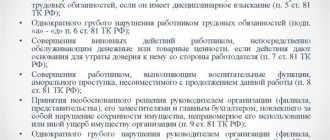How to punish an employee for being late?
How and within what time frame can one be punished for being late and what papers need to be drawn up so that if an employee complains to the labor inspectorate (or to the court), the punishment of the negligent employee does not become a punishment for the company.
If the manager has decided to bring the employee to disciplinary liability and has ordered you to issue a corresponding order, then before drawing it up, check the following circumstances. Circumstance 1. Are the deadlines for applying a disciplinary sanction met? A disciplinary sanction can be applied to an employee within a month from the date of discovery of the misconduct management and within 6 months from the date of its commission (Article 193 of the Labor Code of the Russian Federation; clause 34 of Resolution No. 2).
https://www.youtube.com/watch?v=ytcopyrightru
For reference, the day the misconduct was discovered is the day when the person to whom the offender is subordinate at work learned about the misconduct, regardless of whether this manager has the right to impose penalties or not. In other words, this can be either the head of the company or the head of a workshop, department, etc.
At the same time, the month period from the date of discovery of the misconduct does not include the time of: - illness of the employee himself (please note that other cases of temporary disability (Article 5 of the Federal Law of December 29, 2006 N 255-FZ), including temporary disability in connections with caring for a sick child are included in the monthly period);
— the employee’s stay on any leave (main, additional, educational, without pay). The absence of an employee from work due to the use of time off does not interrupt the flow of the month; this is necessary to determine the opinion of the trade union. This applies only to cases of dismissal for repeated violations of an employee who is a member of a trade union (Clause 5, Part 1, Article 81, Art. Art.
82, 373 of the Labor Code of the Russian Federation). Therefore, if your employee, for example, was late and then fell ill for a long time, then there is no need to fear that because of his illness you will miss a month’s deadline and will not have time to punish him. But it is important to issue an order to apply the penalty within 6 months from the date of delay, because this six-month period is not extended during the employee’s illness and other mentioned periods (Article 193 of the Labor Code of the Russian Federation).
Circumstance 2. Did management choose the sanction correctly? In addition to the fact that only a reprimand, reprimand or dismissal can be applied to an employee (Article 192 of the Labor Code of the Russian Federation), only one penalty can be applied for each misconduct. Therefore, if you are required to draw up an order to immediately issue a reprimand and dismissal, then explain to management that this is illegal.
In addition, keep in mind that when choosing a sanction for an employee, the severity of the employee’s offense, the circumstances under which it was committed, and the employee’s attitude toward work must be taken into account (Article 234 of the Labor Code of the Russian Federation). Therefore, serious disciplinary sanctions should not be applied for minor offenses, much less fired for being five minutes late. Still, dismissal is a last resort.
If an employee was reprimanded for a 5-minute delay that did not cause serious harm to the company, and was fired for a second similar delay, then if he appeals the dismissal, the court may reinstate him at work. And the company, in turn, may be required to pay the employee wages for the entire period of forced absence (Article 234 of the Labor Code of the Russian Federation).
Circumstance 3. Is the employee’s lateness documented? The documents should record:— the fact that the employee was late. Depending on how you record working time, the fact of being late may be recorded: (or) at the checkpoint (as evidenced by the data of the electronic system or timekeeper);
(or) in a report (official) note from the immediate supervisor of the late worker addressed to the head of the organization about the circumstances of the lateness and the advisability of bringing the employee to disciplinary liability; (or) in the act of lateness; - absence of valid reasons for being late. So, if an employee was late because the water supply in his apartment unexpectedly broke at night, and therefore he had to call a plumber, then there is a good reason for the delay.
Please note that the Labor Code of the Russian Federation does not contain a list of valid reasons for being late. Therefore, the issue of “respect” is decided in each case by management. But if an employee appeals against being held accountable in court, the court will not only find out the reason for the delay, but also decide whether the employer assessed it objectively. To find out the reason for the delay, you need to request a written explanation from the employee.
Advice It is better to develop a procedure for recording lateness in advance and register it in the PVTR. Then, in the event of someone being late, the company’s employees, who are entrusted with completing the necessary documentation, will do it promptly and correctly.
In all cases when an employee, through his own fault, does not fulfill any standard established for him (output, time, service, etc.), payment of the standardized part of the salary (salary, tariff rate) is made in accordance with the volume of work performed (Part 3, Article 155 of the Labor Code of the Russian Federation).Proportional payment is also applicable if the employee is late.

Indeed, in this case, the employee does not comply with labor standards (time standards) (Article 160 of the Labor Code of the Russian Federation), which must be reflected in the working time sheet in form N T-12 or N T-13. And one should not confuse such payment for a late worker with a fine. As we have already said, a fine (usually expressed as a percentage of salary) is a sanction not provided for by law at all, and therefore illegal.
As you can see, there are many ways to influence negligent employees - from verbal reprimands to dismissal “under article”. In any case, it is, of course, up to the management to choose the sanction. You may be asked to draw up the papers necessary to punish for being late. But remember that the employee can appeal the disciplinary sanction (Article 193 of the Labor Code of the Russian Federation).
And if the court cancels the penalty, for example, for the reason that it considers it too harsh in a particular situation, then the employee will be considered not to have a penalty. Even if the fact of being late for work actually took place. In such a situation, he can no longer be fired for being late for work again (Clause 5, Part 1, Article 81 of the Labor Code of the Russian Federation).
Try not to put pressure on guilt, manipulate, or threaten. You will only intensify the protest if your employee belongs to the first type of “late”.
We invite you to familiarize yourself with: Sample contract for a team contract in construction
employee) “___”__________ ____ for ________ hour. _________ min. for no valid reason and guided by clause 2, part 1, art. 192, art. 193 of the Labor Code of the Russian Federation, I ORDER: 1. Reprimand ___________________________________________________. (position, structural unit, full name of employee) 2.
The head of the HR department _____________ to familiarize (full name) _______________________________________ with this order within 3 days. (indicate the position and full name of the employee) 3. Entrust control over the execution of the order to ______________________. Reason: 1. Memo _______________________ dated “___”___________ ___ city.
(position, full name) 2. Explanation _______________________ dated “___”________ ___ (option: (position, full name of the employee) act of refusal of the employee to give a written explanation dated “___"___________ ___ g.) {amp}lt;1{amp}gt;. Manager _________________ __________________ _________________ (signature) (full name) The order has been read by: “___”________ ___ city ___________ ___________ (signature) (full name)
Failure by an employee to provide an explanation is not an obstacle to applying disciplinary action.
Labor discipline means unquestioning compliance by employees of enterprises with the rules of conduct in the workplace, enshrined, among other documents, in an employment contract.
Accordingly, any disregard (or dishonest fulfillment) of work obligations by employees will be called a disciplinary violation. For such situations, various disciplinary sanctions are provided.
| ★ Best-selling book “Accounting from Scratch” for dummies (understand how to do accounting in 72 hours) purchased by {amp}gt; 8000 books |
Only disciplinary sanctions are applied to a late employee, since violation of work schedule is a disciplinary offense. There is a rule according to which the punishment should be chosen based on an assessment of the severity of the offense.
The working time schedule includes, among other things, the start and end times of work, the time of breaks in work, the number of shifts per day, etc. and is established by the internal labor regulations (hereinafter referred to as the PVTR) in accordance with labor legislation and other acts containing labor standards rights, a collective agreement, agreements, and for employees whose working hours differ from the general rules established by a given employer - an employment contract (Article 100 of the Labor Code of the Russian Federation).
Working time is the time during which an employee, in accordance with the Labor Regulations and the terms of the employment contract, must perform labor duties, as well as other periods that, in accordance with the Labor Code, other federal laws and other regulatory legal acts of the Russian Federation, relate to working time (Art. 91 Labor Code of the Russian Federation).
All employees are required to adhere to the established working hours. Being late for work is regarded as a violation of this regime, that is, a disciplinary offense, for which employers bring employees to disciplinary liability.
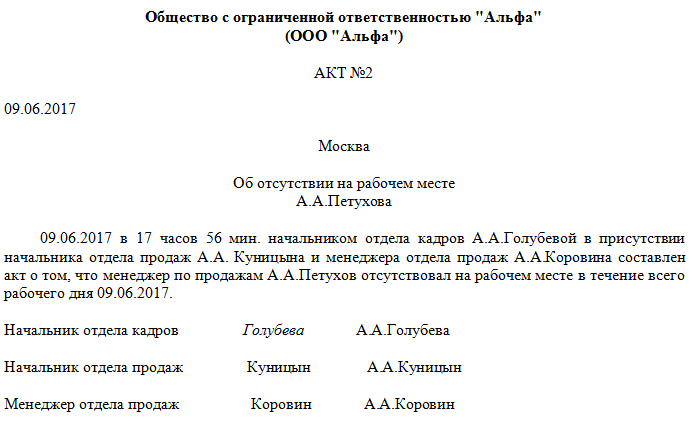
Let us remind you that according to Art. 192 of the Labor Code of the Russian Federation for committing a disciplinary offense, that is, failure or improper performance by an employee through his fault of the labor duties assigned to him, the employer has the right to apply the following disciplinary sanctions:
- comment;
- rebuke;
- dismissal for appropriate reasons. What penalty to apply is decided by the employer himself.
Term of punishment
A violator can be punished for being late for work only within a certain period of time.
- One month from the date of violation. This period is valid in all cases if the violator of discipline was regularly at work for the entire period after the date of delay. It would be illegal to issue an order at the end of the month.
- From the day of discovery. If, after being late, the employee got sick, went on vacation, or went on a business trip. In this case, the deadlines are extended for the entire period of absence, but cannot exceed 6 months. The violation will need to be dealt with within a month after the employee returns to work.
If the employer misses the deadline, issuing a collection order will be unlawful.
How to document being late
It is necessary to record and document every case of lateness, otherwise violations of labor regulations will become systematic. It is worth remembering that delays can occur for reasons beyond the employee’s control. But in this case, he must have documentary evidence of this with him, this could be:
- sick leave,
- certificate from the traffic police,
- medical certificates, directions, conclusions,
- certificate from the Housing Office about the accident,
- a ticket for public transport with a note indicating that the trip has been postponed,
- agenda,
- photo of what caused the violation of labor discipline.
If the enterprise is large, and discipline is monitored by department heads, then each of them can report to the manager about the lateness of their subordinates by drawing up a memo.
Sample memorandum
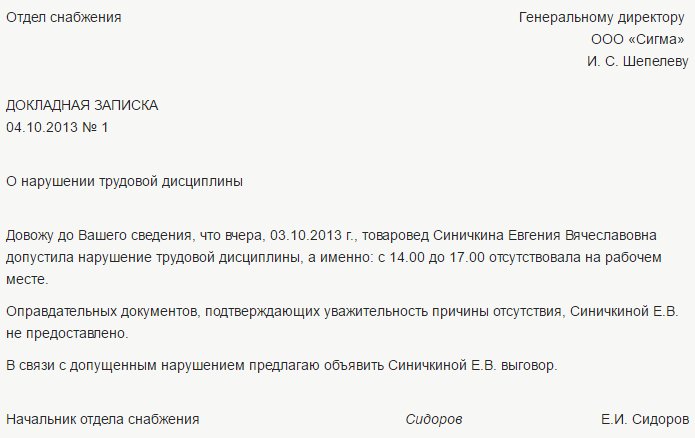
The manager of the late employee needs to draw up a Tardiness Report and give it to several witnesses of the violation to sign.
Sample Certificate of Employee Lateness
An employee who arrives late is required to draw up an explanatory note explaining the reasons for the violation of discipline (if he has a document proving the existence of a valid reason for being late, he should attach it to the note).
Sample explanatory note
If the employee does not want to write an explanatory note, a report about this is also drawn up.
Sample Certificate of refusal of an employee to write an explanatory note
What disciplinary violation can be applied for being late or absenteeism?
Violation of labor regulations and discipline is not permitted. When being hired, an employee signs documents upon familiarization that establish the rules of conduct and work schedule (in any case, this is required by labor legislation, but some employers neglect this). They sign and the employee undertakes to comply with the work schedule, be at the workplace at the appointed time, and come to work on time.
If violations nevertheless occur, the manager decides how to punish the employee. The law stipulates three types of penalties, but no explanation is given as to which type of penalty should be applied for which offense. Therefore, the employer decides this issue independently on the basis of the received documentation indicating a violation of labor discipline (absenteeism or tardiness). The employee’s explanations, the circumstances of the incident, possible consequences in the form of material damage or harm to health, and the frequency of repetition of such a violation are taken into account.
In practice this is usually done.
Being late once is not punished in any way, but a verbal warning is given. Repeated tardiness may be punished with a written reprimand. Repeated, frequent tardiness may result in a reprimand.
If lateness develops into absenteeism, then you can even be fired or reprimanded for one absence.
In any case, before preparing an order to impose a disciplinary sanction for being late or absenteeism, you need to collect evidence that will confirm the employee’s guilt and be sure to listen to the offender. The degree of respectability of the reason given by the employee in his justification is determined by the manager independently.
It is impossible to punish deprivation of salary, bonus or other payment if there is no corresponding act that prescribes such fines.
Documenting the imposition of a disciplinary sanction
The fact of violation is recorded in an act - an act of absence from work.
The head of the unit writes a memo - a sample memo about absenteeism.
The employee writes an explanatory note - a sample explanatory note about being late or absenteeism.
Upon review of the above and additional documents, the manager makes a decision on possible disciplinary punishment. If the decision is positive, an order is drawn up. If a reprimand is announced and entered into the work book, then the entry is made on the basis of the order. If an employee quits, then the standard procedure for terminating the employment contract without working off is carried out at the initiative of the employer.
How can you punish for being late?
Only three disciplinary sanctions can be applied to an employee (Articles 192, 193 of the Labor Code of the Russian Federation): (or) reprimand; (or) reprimand; (or) dismissal in a situation where: - the violation is repeated, that is, the employee has committed such an offense at least twice. And for the first one he was given a reprimand or reprimand (Clause 5, Part 1, Article 81, Article 192 of the Labor Code of the Russian Federation);
- the validity period of the previous disciplinary sanction has not expired - a year from the date of issuance of the order on its application (unless the previous sanction was lifted from the employee ahead of schedule) (Clause 5, Part 1, Article 81, Article 194 of the Labor Code of the Russian Federation; Clause 33 of Resolution No. 2 ). For example, if the last time an employee was reprimanded for being late was a year and a half ago, now it is no longer possible to fire him for being late again.
You cannot issue a dismissal order at the initiative of the employer when the employee is on vacation or sick leave. If an employee challenges his dismissal in such a situation, the court will reinstate him at work and oblige the company to pay him for the entire period of forced absence (Articles 81, 234 of the Labor Code of the Russian Federation).
Method 2. Do not pay the employee a bonus or pay it in a smaller amount. To do this, two conditions must be met (Articles 129, 135 of the Labor Code of the Russian Federation): - your organization must have a local regulatory act providing for the payment of bonuses (for example, a regulation on remuneration or a regulation on bonuses for employees of the organization);
- this local act should provide as a mandatory condition for bonuses that the employee comply with labor discipline, PVTR, and the absence of disciplinary sanctions during the period for which the bonus is paid. If these conditions are met, you simply will not include the violator in the circle of bonused workers.
It is incorrect to include in the wage regulations such a measure as deprivation of bonuses (deprivation of bonuses). The labor inspectorate will regard it as a disciplinary sanction not provided for by the Labor Code of the Russian Federation. Simply establish proper compliance with labor discipline by the employee as a mandatory condition for bonuses.
The “monetary” consequences for the employee described here are not disciplinary actions. Therefore, it is possible to simultaneously not pay the bonus to the violator and bring him to disciplinary liability. That is, in this case, the requirement of the Labor Code of the Russian Federation that only one disciplinary sanction can be imposed for one disciplinary offense will not be violated (Article 193 of the Labor Code of the Russian Federation).
In practice, managers often require late workers to stay after work. This cannot be done, because such a measure is not provided for as punishment by labor legislation. Involvement in work at the initiative of the employer at the end of the working day is overtime work, which must be properly documented and paid (Articles 99, 152 of the Labor Code of the Russian Federation).
If the manager does not object to the employee coming to work later, but wants him to work his entire daily quota, then it is more convenient to agree with him on a flexible working time regime (Article 102 of the Labor Code of the Russian Federation).
We invite you to read: What is a reprimand under the Labor Code of the Russian Federation and its types
In addition, types of disciplinary sanctions not provided for by the Labor Code of the Russian Federation, such as fines, demotion, postponement of vacation, etc., cannot be included in the PVTR. If, during the inspection, the labor inspector discovers that your PVTRs provide for such penalties, he will issue an order to bring them into compliance with the Labor Code of the Russian Federation.
Order to issue a reprimand for being late
If you refuse to sign a document, you need to draw up an appropriate act (you should never forget that a subordinate can challenge the employer’s actions in court or complain about him to the territorial labor inspectorate).
Information about a single reprimand is not entered into the employee’s work book, but is recorded in the order of dismissal for systematic violations, if it occurs during the period of its validity.
The order form itself, completed in accordance with all the rules, after entering into force, is transferred for storage to the archive of the enterprise, where it is kept for the period established for such documents by the legislation of the Russian Federation.
Being late for work - what are the dangers and how to deal with it?
As practice shows, most often they fall on the execution of personnel department employees. However, the head of any department or service has the right to order the imposition of punishment on an employee.
Attention In any case, the executor coordinates it with interested parties, after which he submits it to the head of the institution for signature. Labor Code of the Russian Federation in the latest edition Familiarization with the document on disciplinary action rests entirely with the performer
Important As a general rule, the period for an employee to become familiar with an order is three days. How to write a disciplinary order for being late? It is a violation of discipline if an employee is late for work.
Being late is not showing up for work at a strictly established time.
To punish a late employee, you need to draw up a disciplinary order. Its form is written.
Order of reprimand for being late for work
For such situations, various disciplinary sanctions are provided. For violation of labor discipline, such as being late, it is prohibited by law to withhold money from wages, otherwise management will incur administrative punishment.
Disciplinary measures for lateness Only disciplinary sanctions are applied to a late employee, since violation of the work schedule is a disciplinary offense. There is a rule according to which the punishment should be chosen based on an assessment of the severity of the offense.
For one offense, one punishment should follow (and it must be applied within a month, maximum 6 months, not counting the employee’s time on vacation); applying several different punishments at once against an employee who has committed only one offense is unlawful on the part of the employer.
Disciplinary action for being late for work
Nowadays, it is not uncommon for company employees to abuse labor discipline by being late for work from time to time. At the same time, late arrival to the workplace often happens for no valid reason.
Sometimes such delay can cause significant losses to the company. We will tell you how you can punish a negligent employee.
Using examples, you will see which documents should be filled out and how to avoid future disputes in court. What is lateness? The concept of working hours includes not only the start and end times of work, but also the time of breaks in work.
In this case, the working time regime (common for the organization’s employees) is fixed in the internal labor regulations, and for employees whose working time regime differs from the general rules established by a given employer - in an employment contract (Art.
Art.
How to write a disciplinary order for being late?
If the employee is unable to sign the order due to absence from work, then this period is extended. If an employee does not want to confirm familiarization with the order with a signature, a report to this effect is drawn up.
Where can I order a reprimand for failure to fulfill duties? You can download a sample order for a disciplinary sanction - a reprimand - on our specialized portal.
A sample order to reprimand an employee is available here.
We announce a reprimand or reprimand
Petrov If, after two working days, the employee still does not provide an explanation for the reasons for absence from the workplace, then an appropriate report should be drawn up (see example 5). Example 5.
Limited Liability Company Autotech AKTob refusal to give explanations about the reasons for absence from work 24.03.
2011 N 2 By me, director Sergei Alekseevich Rybakov, in the presence of the head of the garage A.I.
Features of dismissal if late
If a company employee consistently shows up late or does not show up for work and is subject to disciplinary action, management has the legal right to fire him, but is not obligated to do so. If an employee does not violate labor discipline during the year, he is recognized as a conscientious employee. The employer may also cancel the penalty earlier than one year after the violation.
As the experience of employers defending their positions in court shows, an employee should not be fired if he was really constantly late for work, but this had not been observed before, no cases of late arrival to work were recorded, and the decision to fire him was made then when the employee has no outstanding penalties for violations in the past.
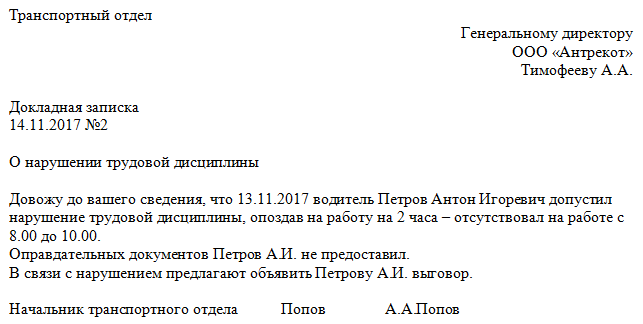
When filling out the T-8 form, the reason for termination of the employment relationship must be indicated, and the following entry must be made in the work book:
- “The employment contract was terminated at the initiative of the employer due to the employee’s repeated failure to fulfill his work duties without good reason.”
Clause 5 of Part 1 of Art. must be indicated as the basis for termination of cooperation. 81 Labor Code of the Russian Federation. When the employee receives the work book, he signs the personal card (where the entry about the reason for dismissal must be duplicated).
What should an employee do if they are late?
You can explain being late and try to smooth the situation over.
Every employee has faced a situation where it is not possible to get to work on time. What needs to be done to reduce penalties to a minimum or avoid punishment altogether? Possible sequence of actions:
- It is highly advisable to notify your immediate superiors about the delay and explain the reasons. Even if they are disrespectful (overslept, got stuck in a traffic jam, etc.), management can be understanding and do without a reprimand. In any case, it is better to warn than to hope that no one will notice your absence.
- If the reason for being late is valid, it must be documented. If you felt unwell and went to the clinic, you will need a certificate from a doctor; if you were in an accident, you will need a certificate from the traffic police. If there was a utility accident at home, you will subsequently need to obtain a certificate from the housing office and present it at work as a supporting document.
- Write an explanatory note. This document is written at the request of management and gives the employee the opportunity to speak out and explain all the reasons for the misconduct. The explanatory note itself is not an exculpatory document; it must be accompanied by evidence of valid reasons.
What should you never do? Firstly, it is extremely undesirable to lie. If the relationship with your superiors is good, it is better to name the true reason for being late and promise not to allow this to happen again, rather than childishly invent non-existent circumstances. Secondly, it is better not to try to falsify doctor's certificates and other documents to justify oneself. This will not improve the situation, but will only worsen it, since management can easily verify the authenticity of any document if doubt arises.
If it turns out that an employee used a fake certificate, he will most likely be fired. In addition, criminal prosecution awaits the doctor or police officer who issued the forged document. In order not to complicate life for yourself and others, it is better to refuse unnecessary risks.
Legislative acts on the topic
| Art. Art. 57, 100 Labor Code of the Russian Federation | On fixing in an employment contract the work schedule of employees whose work schedule does not coincide with the general work schedule |
| Art. 209 Labor Code of the Russian Federation | Definition of a workplace |
| Letter of Rostrud dated March 11, 2009 No. 1146-TZ | On taking into account lateness without a good reason as a violation of the working hours |
| Art. 21 Labor Code of the Russian Federation | The fact that the employee is obliged to conscientiously fulfill his labor duties assigned to him by the employment contract, as well as to observe labor discipline |
| Art. 192 Labor Code of the Russian Federation | About disciplinary sanctions |
| clause 5 art. 81 Labor Code of the Russian Federation | Dismissal of an employee for repeated lateness |
| Art. 194 Labor Code of the Russian Federation | On the employer’s right to lift a disciplinary sanction from an employee earlier than one year after the violation |
| clause 33 of the Resolution of the Plenum of the Supreme Court of March 17, 2004 No. 2 | On the illegality of dismissing an employee who has not previously been punished for violations of labor discipline, or who has no outstanding disciplinary penalties. |
| Resolution of the State Statistics Committee of the Russian Federation dated January 05, 2004 No. 1 “On approval of unified forms of primary accounting documentation for recording labor and its payment” | Approval of the unified form No. T-8 for cases of dismissal of employees |
| clause 5, part 1, art. 81 Labor Code of the Russian Federation | Grounds for termination of employment relations with an employee |
Disciplinary action for being late for work
One of the mandatory conditions for dismissal under clause 5, part 1, art. 81 is to comply with the procedure for bringing disciplinary action upon detection of both the first and second violations.
The dismissal is formalized by an order of dismissal for this reason; in the “Grounds” column, memos, acts and explanatory notes of the employee are indicated. The issuance of a second order to apply a disciplinary sanction in the form of dismissal in this case is not required.
An order can be issued if no more than one month has passed since the discovery of the offense. At the same time, the specified period does not include the time of illness of the employee, his stay on vacation (vacation that interrupts the monthly period includes all types of vacations provided for by law), the time provided to comply with the procedure for taking into account the reasoned opinion of the elected trade union body (clause 34 of Resolution No. 2).
The employment contract was terminated due to the employee’s repeated failure to fulfill labor duties without good reason if he had received a disciplinary sanction, paragraph 5 of part one of Article 81 of the Labor Code of the Russian Federation.
Unfortunately, being late for work is one of the most common occurrences in professional life.
People of different ages and different genders are late for work.
Lateness to work often becomes chronic, which greatly undermines the success of an employee who abuses the company’s trust.
If this employee is not a superior person, or a favorite of the company, to whom everything is forgiven, then problems at work are inevitable.
There are different options for the development of events:
- Demotion.
- This employee will become a “scapegoat” for his superiors and will do all the menial work, especially if he feels guilty for being late.
- Dismissal of an employee (either at his own request or at the request of management), etc.
Being late is a serious problem for a company, and employee lateness is often perceived as irresponsible behavior, especially if lateness to work is regular.
In fact, being late for work is not always a consequence of an irresponsible attitude to work.
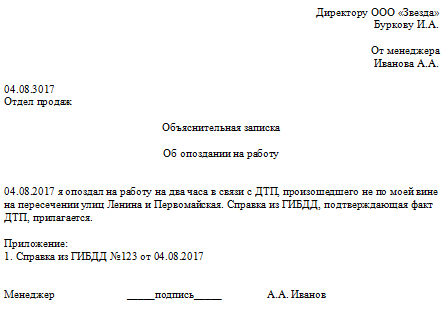
The reasons for regular lateness can be completely different, let's look at some of them.
- "Protest". There are people for whom being late is a protest against injustice, against rules, laws. These “latecomers” are not latent hooligans; more often than not, there was a situation in their lives that prompted such a protest. This is a child’s position in which a rebel child manifests itself; the child continues to protest, even when the person has become an adult. For example, a child could be severely scolded for returning later than expected, and at that time he was helping a small defenseless animal. The parents, without listening to the child, blamed him, punished him and from then on, as a sign of protest, the child began to be late.
- "Fear of expectations." There are people for whom the state of waiting is very painful; they unconsciously try to come later so as not to wait. A striking example of a little boy whose mother forgot to pick him up from kindergarten. While the child was waiting for his mother, he experienced a whole range of feelings from guilt and loneliness to abandonment and fear. As an adult, he forgot about that situation, this situation was squeezed into the subconscious, but continued to influence, he avoided waiting in every possible way, preferring to come later, because he did not want to experience again the same experiences as in childhood.
- “Sense of superiority and black PR.” Let them wait - with this slogan those who are accustomed to attracting attention in a wide variety of ways go slowly to work. Children who did not have enough love and attention in childhood can manifest themselves in a similar way, as if they don’t care whether they are treated well or poorly, the main thing is that they pay attention.
- "Master of Time" Another type of people who are late for work. These “latecomers” absolutely do not know how to properly and effectively manage their time; these are the ones who, while washing in the bathroom using a telephone receiver, imitate the sound of a passing tram. They desperately fight against time, they want to defeat it and become its master, but they pay for their ambitions by being constantly late.
- "Scapegoat". With guilty and downcast eyes, they enter the office every time, their depressed, shrunken appearance seems to say: “You can beat me, let’s start.” This type of “latecomer” is used to being a victim, but thereby he receives attention.
- "An extinguished match." If a person was working, working normally, and at some point began to be late, then one of the possible options is that the employee is simply tired, burned out, and his body is trying in every possible way to tell him: “That’s enough, let’s rest.” These delays signal that you need to rest and get yourself in order.
There are other types of “late people”, each person has his own story and it is very important to determine exactly your story and the reason for being late in order to stop spoiling your career, relationships with colleagues and superiors.
How can this be done and what will really be effective?
We invite you to read: Who has the right to enter the apartment without your consent? — All about Ufa and more
So, for complete efficiency, recommendations will be presented below both for the “latecomers” themselves and for their managers, who also receive punishment from their superiors for not being able to keep track of their subordinates!
Recommendations for Managers: what to do if a subordinate starts to be late.
- If your employee begins to be late or you begin to notice systematic lateness to work, invite the employee to a conversation (do not ignore this).
- During the conversation, it is important to speak frankly, do not try to quickly wrap up, especially if this is a valuable employee. Your task is to understand why the employee is late! The task here is not to conduct psychological counseling; it will be great if you can motivate your employee to jointly recognize and understand the problem in order to solve the situation.
Order on punishment for being late for work
Try not to put pressure on guilt, manipulate, or threaten. You will only intensify the protest if your employee belongs to the first type of “late”.
Recommendations for those who are late: how to cope with your tardiness.
- The most important thing to ask yourself is: “Why am I late? What does being late do for me? and look for the ultimate meaning, perhaps you will be able to get to the bottom of the truth without the help of a psychologist and realize the reason for your delays, and everything that you have realized, you can already control, which means changing your usual patterns of behavior.
- Give yourself what you need, delays often hide unfulfilled needs, become aware of them and begin to satisfy them.
- If your reason for being late is constantly waking up, find ways to make your morning pleasant and get up without difficulty.
- If your internal benefits from being late are strong and stable (they arose in childhood), and you probably feel this, then any methods, be it a contrast shower, setting the clock back half an hour, etc. will be useless or will act temporarily until you realize your internal benefits regarding your delays!
Being late for work can ruin your career, undermine your reputation, authority, they will no longer respect you and treat you as a serious, purposeful person, which means you will not see any advancement in your career.
Therefore, if you still want to achieve success in life, certain heights in your career, take care of yourself and your future!
See you in the next issues!
Top {amp}gt;{amp}gt;
____________________________________________ (name of employer) ORDER N _________, _________________ “___”__________ ___, On imposing a disciplinary sanction on __________________________________ (position, full name of the employee) Due to being late for work _____________________________________________ (position, full name of the employee) .

